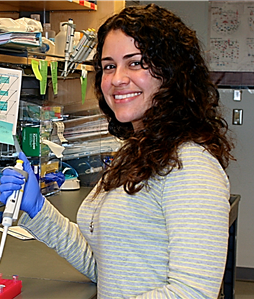
Roxana Loperena, Ph.D.
Department: Molecular Physiology & Biophysics, 2018
Faculty Mentor: David Harrison, M.D.
Dissertation Title: The Role of Vascular Activation on Monocytes in Hypertension
Dissertation Abstract: It is increasingly evident that inflammation and immune activation occur in hypertension, by mechanisms that are poorly understood. Monocytes play an important role in hypertension. Circulating monocytes in humans exist as classical, intermediate and non-classical forms. Monocyte differentiation can be influenced by the endothelium, which in turn is activated in hypertension by mechanical stretch. We sought to examine the role of increased endothelial stretch and hypertension on monocyte phenotype and function. Human monocytes were cultured with confluent human aortic endothelial cells undergoing either 5% or 10% cyclical stretch. We also characterized circulating monocytes in normotensive and hypertensive humans. In addition, we quantified accumulation of activated monocytes and monocyte-derived cells in aortas and kidneys of mice with Angiotensin II-induced hypertension. Increased endothelial stretch enhanced monocyte conversion to CD14++CD16+ intermediate monocytes and monocytes bearing the CD209 marker and markedly stimulated monocyte mRNA expression of interleukin (IL)-6, IL-1β, IL-23, chemokine (C-C motif) ligand 4 and tumor necrosis factor α. STAT3 in monocytes was activated by increased endothelial stretch. Inhibition of STAT3, neutralization of IL-6 and scavenging of hydrogen peroxide prevented formation of intermediate monocytes in response to increased endothelial stretch. We also found evidence that nitric oxide (NO) inhibits formation of intermediate monocytes and STAT3 activation. In vivo studies demonstrated that humans with hypertension have increased intermediate and non-classical monocytes and that intermediate monocytes demonstrate evidence of STAT3 activation. Mice with experimental hypertension exhibit increased aortic and renal infiltration of monocytes, dendritic cells and macrophages with activated STAT3. To gain insight into how STAT3 in dendritic cells modulate hypertension, mice lacking this gene were created by crossing STAT3loxp/loxp mice with expressing cre recombinase under control of the CD11c promoter (STAT3/CD11c KO mice). The mice displayed a modest decrease in hypertension caused by Angiotensin II infusion, however, exhibited poor health, rectal prolapse and high mortality when subjected to telemetry placement, making full characterization impossible. These findings provide insight into how monocytes are activated by the vascular endothelium during hypertension. This is likely in part due to a loss of NO signaling and increased release of IL-6 and hydrogen peroxide by the dysfunctional endothelium and a parallel increase in STAT activation in adjacent monocytes. Interventions to enhance bioavailable NO, reduce IL-6 or hydrogen peroxide production or to inhibit STAT3 may have anti-inflammatory roles in hypertension and related conditions.
